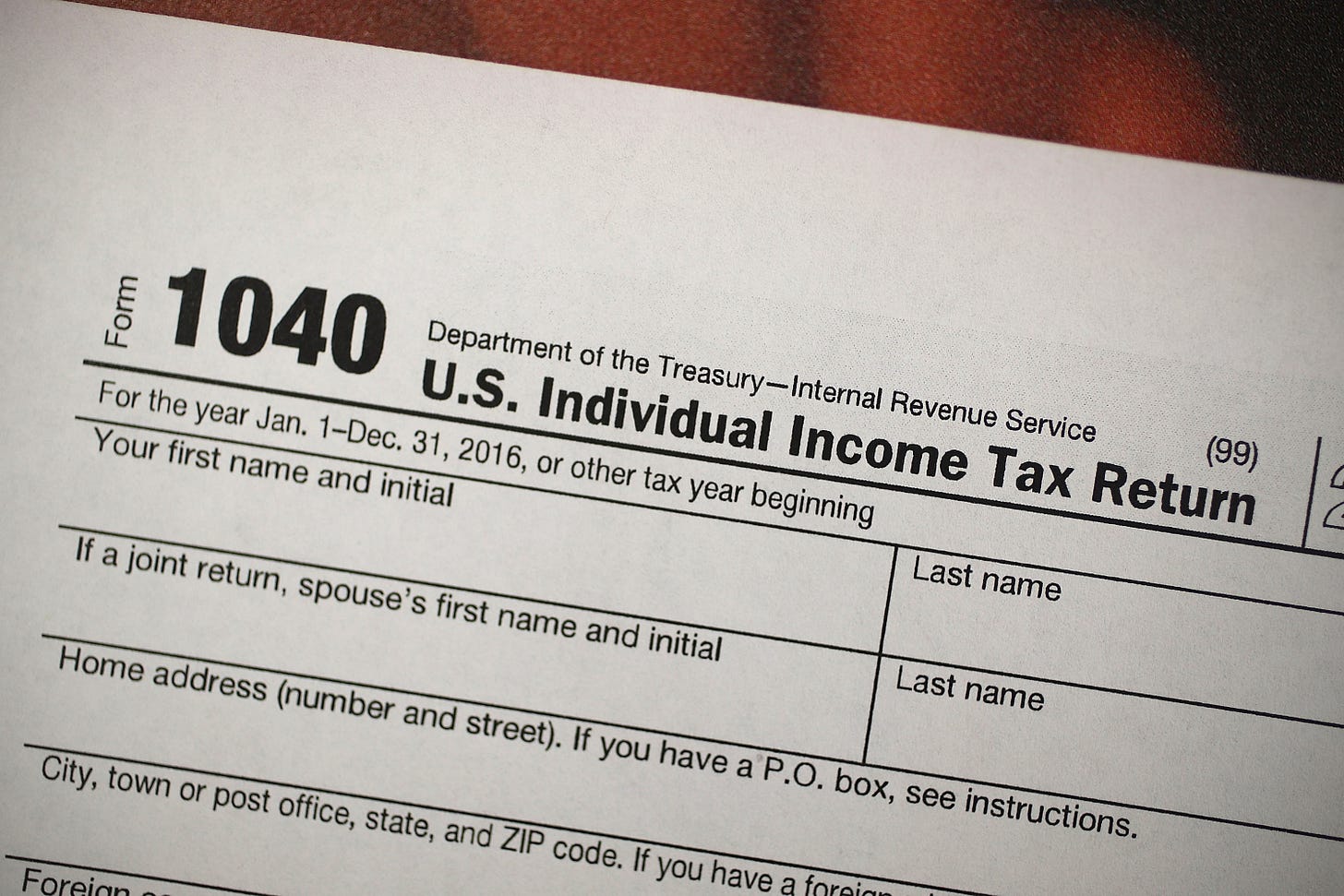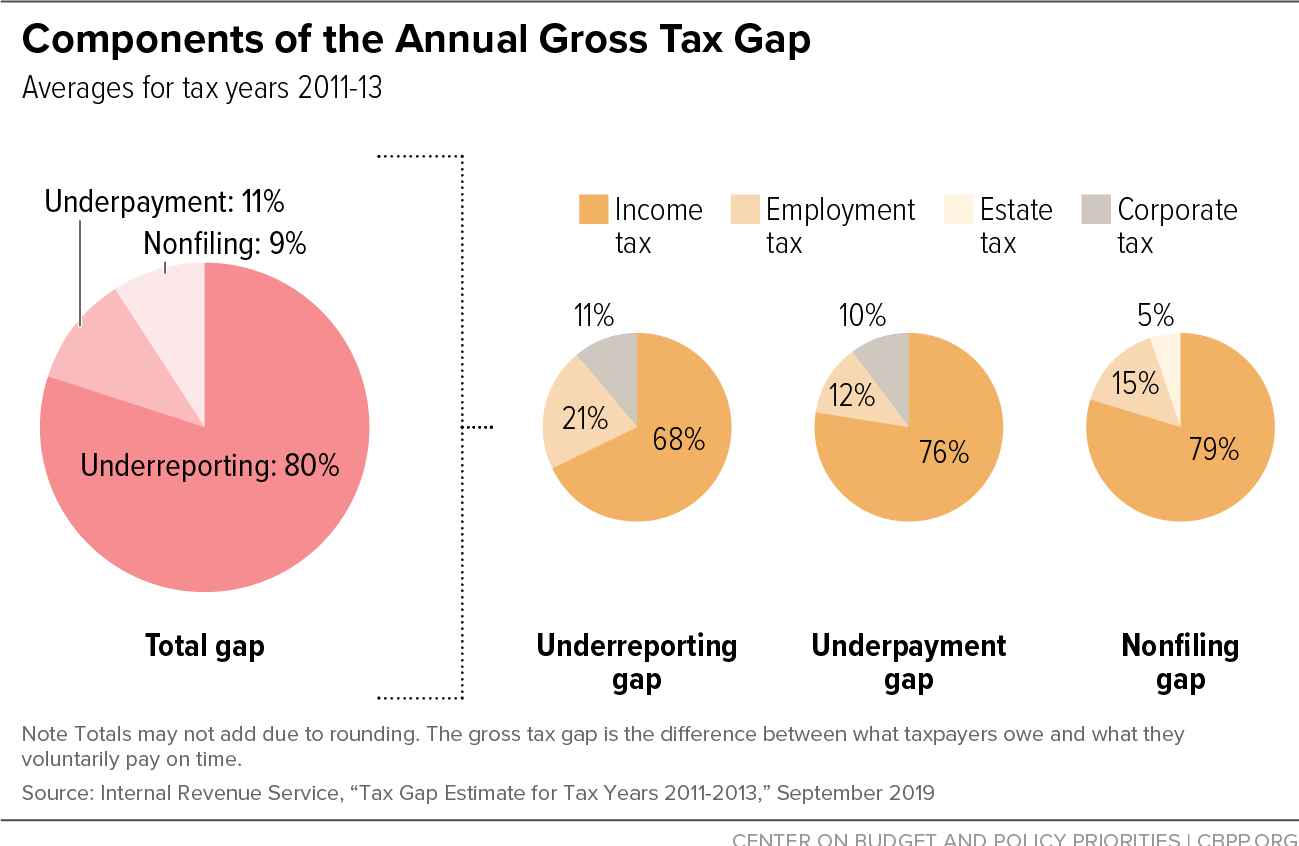Fund the tax police
The IRS needs to spend money to make money
Once upon a time, the United States relied on customs revenue to finance the bulk of public spending. Today’s version of the Customs and Border Protection agency obviously spends the bulk of its $18 billion annual budget on matters related to immigration rather than revenue. This leaves the un-beloved Internal Revenue Service and its smaller $11 billion budget with the responsibility of collecting the vast majority of the taxes.
For most filers, this is a fairly straightforward matter these days. When a company pays its workers, it wants to fully inform the IRS of what it’s paid, because those wages and salaries are a deductible expense.
Thus, since the IRS has already been informed of what you have been paid, it can easily verify whether or not your self-report of your salary is accurate and see if you’re paying taxes correctly. What’s more, in a standard situation, taxes are withheld from your paycheck whenever it comes out, so there’s actually no need for you to pay at all. Instead, you claim a refund when you file, which then gets paid out.
The two big exceptions to the smooth operation of this system are poor people who are trying to claim various welfare state benefits that operate through the tax code, and rich people who have complicated tax situations due to ownership of businesses and claiming various itemized deductions. Tax enforcement against the working poor is basically necessary given the current structure of the welfare state, but it’s not very lucrative. By contrast, auditing the rich can raise huge sums of money. But precisely because there are large amounts of money at stake, auditing the rich is hard and years of deliberate austerity budgeting have made it impossible. To boost revenue, we need to fund the tax police.
The IRS is doing fewer audits
Paul Kiel did a piece for ProPublica in May 2019 headlined “It’s Getting Worse: The IRS Now Audits Poor Americans at About the Same Rate as the Top 1%,” and if you read the piece — well, that’s what it says. If you delve into the details, I think this isn’t quite right (more on this later), but it is true that audit rates for the top one percent have been declining fast.
His October followup, by contrast, struck me as having a sort of unfair headline: “IRS: Sorry, but It’s Just Easier and Cheaper to Audit the Poor.”
That made it sound like the IRS is just being lazy or making excuses for itself, but Kiel’s reporting makes it pretty clear that the IRS is correct. Doing a forensic audit on a rich person’s tax return requires time and specialized skills, and the agency has been deliberately deprived of those things since the 2010 midterms:
For now, the IRS says, while it agrees auditing more wealthy taxpayers would be a good idea, without adequate funding there’s nothing it can do. “Congress must fund and the IRS must hire and train appropriate numbers of [auditors] to have appropriately balanced coverage across all income levels,” the report said.
Since 2011, Republicans in Congress have driven cuts to the IRS enforcement budget; it’s more than a quarter lower than its 2010 level, adjusting for inflation.
Recently, bipartisan support has emerged in both the House and Senate for increasing enforcement spending, but the proposals on the table are relatively modest and would not restore the budget to pre-cut levels. However, even a proposed small increase might not come to pass, because it’s unclear whether Congress will actually pass any appropriations bills this year.
And when you look at the numbers, it’s not as if the IRS is auditing the poor instead of auditing the rich. They are simply auditing less, with a disproportionate fall in the more complicated cases:
It goes to dotted lines after 2015 because the newer years are within the statute of limitations, so some audits just haven't been completed yet, a disproportionate amount of which are the time-consuming audits of the really-rich. You sometimes see charts that elide that distinction and exaggerate the recent decline. But the trend toward fewer audits, especially of the very wealthy, is clear.
And while it’s formally a consequence of the faddish austerity politics of the mid-Obama years, in fiscal terms it makes no sense.
The tax gap costs America trillions
Larry Summers and Natasha Sarin, who is now working at the Treasury Department, calculated in a November 2019 research paper that with modest investments you could raise about $1 trillion in revenue over the next ten years:
Between 2020 and 2029, the IRS will fail to collect nearly $7.5 trillion of taxes it is due. It is not possible to calculate with precision how much of this “tax gap” could be collected. This paper offers a naïve approach. The analysis suggests that with feasible changes in policy, the IRS could aspire to shrink the tax gap by around 15 percent in the next decade—generating over $1 trillion in additional revenue by performing more audits (especially of high-income earners), increasing information reporting requirements, and investing in information technology. These investments will increase efficiency and are likely to be very progressive.
This CBPP report has a helpful summary graphic of where the tax gap comes from. One thing to note is that while non-filing is the smallest slice of the tax gap pie, it’s probably the most trivially easy to go after.
Indeed, in a piece written for the Washington Post, Sarin and Summers observe that “less than 1 percent of high-income non-filers are responsible for a full third of the high-income non-filing tax gap. Indeed, roughly one-fourth of the high-income non-filing tax gap — about $10 billion between 2014-2016 — is attributable to just the 100 most egregious non-filers in each year.”
I’m trying to be more rigorous about my thinking, and this is an important part of why increasing IRS funding is such a no-brainer. Can we really get the Summers and Sarin $1 trillion over ten years? Maybe. But if I’m honest, I’ll admit I’m not totally sure. What’s super-clear, though, is that you could get that rich non-filer money. And that basically ensures that a substantial investment in increased IRS funding will pay for itself. Anything else you end up getting — and we can be very confident that you’ll get something — is essentially gravy.
The Biden administration is calling for a $1.2 billion increase in the IRS budget, and the current IRS Commissioner agrees that there’s potentially as much as $1 trillion per year out there for his agency to grab.
Broken windows for rich people
Beyond the narrow fiscal considerations, I think tightening up tax enforcement is significant for broader social reasons.
The reason is that tax enforcement is a primary window into a larger universe of criminal activity. People sometimes quip about them busting Al Capone for tax evasion like they got him on a cheap trick. But the truth is that tax enforcement is where the rubber hits the road in terms of a lot of serious illegal activity. The Paul Manafort case revealed that he was engaged in a whole bunch of undetected white-collar crime until he fell under the scrutiny of a special counsel. More rigorous tax enforcement would have caught him much sooner and addressed the wider spectrum of wrongdoings he was engaged in.
Polls also consistently show public concern that the rich are not paying their fair share, which is obviously a subjective concept, but “it’s unfair for rich people to cheat on their taxes and get away with it” seems like low-hanging fairness fruit.
At some point on the road to building a better society with a more robust welfare state, I think we are going to need some broad-based taxes and not just taxes on the rich. The politics of that are inevitably going to be tricky. But making sure the rules are fairly enforced is a key step in the road.
Making taxes better for the non-rich
The other big thing on tax administration is that for the non-rich, taxes should be much, much simpler.
To circle back to where we started, in most cases, the IRS knows exactly how much in taxes you owe because your employer and your bank have already told them. Instead of you filling out a bunch of forms that you mail to the IRS and then they check against their records, it should happen the other way around. The IRS should check their records, and mail you a form explaining what they think you owe and either billing you for the balance or else handing you your refund.
If you want to do the work of filling out your own forms and objecting to the IRS’s math, that option should be available to you. But the vast majority of people have fairly simple tax situations. The big tax prep companies like H&R Block and TurboTax always fight the idea of pre-filed taxes, but it’s a very easy change that could make life better for a lot of people.
Last but by no means least, as Marc wrote the other day, we could do a lot of good by shifting welfare state functions out of the tax code and making them explicit spending programs. That would get benefits to a larger share of the population that needs them and it would also mean there wouldn’t be constant questions about erroneous tax credit claims taking up audit time. Then, IRS resources could direct their focus to where the real money is — the rich tax cheats who’ve been profiting off austerity budgets for the past decade.






I quit journalism mid-aughts and, seeking a stable career, started a grad program in accounting. Hiring dried up due to the 2007 great recession, and I ended up taking a job as a state tax auditor.
It was easily the most interesting job I've ever had. Getting to see how businesses work and how many weird ways there are to make money was fascinating. Spend a week at an online store that sells survivalist supplies getting to see every cent in and out. The occupy the next few days with a tiny company that makes millions renting portable toilets to events.
The pay was terrible; benefits - pension, four-day work week - were amazing. It was also very hard. So much business falls into ambiguous grey areas of taxability. You could ask three different supervisors questions regarding whether a particular activity was taxable and might end up with four different, conflicting answers.
I left after a couple years for better pay. Was soon making 3x as much in a respected firm - that was only about 20% as hard as being a good state tax auditor.
I've been looking at the IRS job listings lately out of nostalgia. Pay is actually solid.
The Trump years revealed to me that something I had always downplayed was actually true -- that there is a vast, almost-invisible ocean of white-collar crime happening every day in this country and that the vast majority of those people will never face any consequences.
I'd be willing to bet that the sum total of all that criminal activity is a serious drag on the nation as a whole. No one act gums up the works, but a bunch of criminal shady activity from many powerful people sure adds a lot of friction to the machinery of American society.